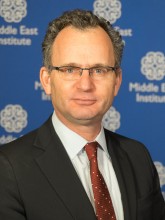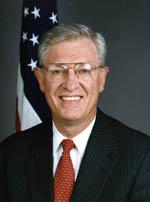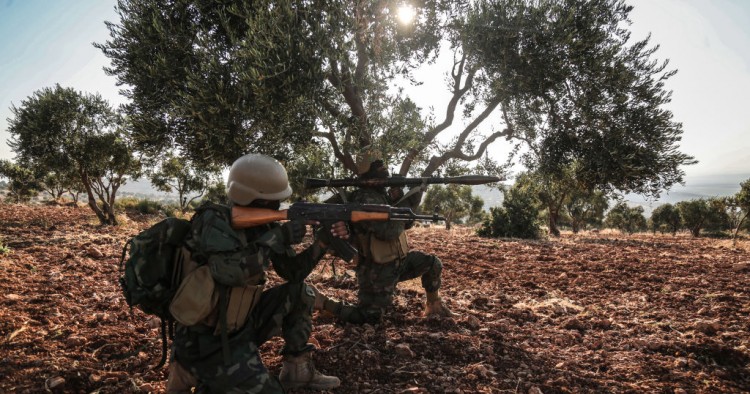This week's briefing on recent news and upcoming events in the region including the Turkish-U.S. crisis meeting in Ankara on Syria, the resumption of U.S.-Taliban negotiations, Trump's creation of a new "dovish" line on Iran, a rise in Egypt's poverty levels, Sudan's democratic transition, the easing of female guardianship rules in Saudi Arabia, and the end of the ceasefire in Idlib, featuring Charles Lister, Marvin G. Weinbaum, Paul Salem, W. Robert Pearson, Mirette F. Mabrouk, Thomas W. Lippman, and Robert S. Ford.
US-Turkey dispute over Syria comes to a head
Charles Lister
Director of Countering Terrorism & Extremism program

American and Turkish military officials convened a crisis meeting in Ankara on Monday, in an attempt to avert an imminent Turkish military intervention into northeast Syria, which President Recep Tayyip Erdogan appeared to announce on Sunday. Despite six months of negotiations, the U.S. and Turkish positions simply remain too maximalist in each other’s perceptions to define the terms of any possible agreement. Sadly, this eventuality was entirely inevitable. If anything, it is a surprise that it took this long to clarify. Both Turkey and the U.S. are at fault, but the seeds of this catch-22 situation were laid by the Obama administration, whose own senior staff have since described the controversial decision to prioritize ties with a group our own government identified as a terrorist organization and its impact on Syria strategy and U.S.-Turkey ties as “flying the plane while we built it.”
Should Turkey intervene, it will do so in such a way as to avoid threatening American troops, which currently lack the congressional authority to defend their allies, the Syrian Democratic Forces (SDF) — a fact not lost in Ankara. Consequently, a Turkish intervention poses an existential threat to America’s mission in Syria. Were the SDF to be left undefended, our relationship with them would suffer immeasurably, leaving U.S. troops exposed and likely untenable. President Donald Trump’s gut instinct to leave could then suddenly become a sensible policy. In short order, America’s entire diplomatic strategy for Syria would fall apart, as our leverage would vanish once our departure became a concrete reality.
Meanwhile, Syrian jets and helicopters launched multiple airstrikes on opposition-controlled localities in northwest Syria on Monday afternoon, officially negating a four-day-old ceasefire that was never fully observed. In reality, pro-regime artillery continued to hit populated areas of the northwest almost hourly through each of the ceasefire’s four days. In response, opposition factions were firing back. The brief reprieve for civilians was real, but it was never complete. Today’s resumption of round two augurs very poorly for the already dire humanitarian situation. The original initiation of hostilities in late April saw the “cat let out the bag,” making any long-lasting truce an impossibility.
Major questions remain as US-Taliban talks resume
Marvin G. Weinbaum
Director for Afghanistan and Pakistan Studies

Talks between the U.S. and Taliban delegations resumed over the weekend in Doha with renewed expressions of optimism that an agreement is within reach. Expectations are running high that Secretary of State Mike Pompeo’s Sept. 1 date for the conclusion of a deal can be met.
The likely outlines of agreement are well known. In exchange for a scheduled U.S. troop departure, the Taliban has conveyed its readiness to denounce ties to al-Qaeda and ensure against Afghanistan serving as a launching pad for terrorism. Taliban leaders are also supposedly ready to commit to a ceasefire and negotiations with fellow Afghans over the country’s future.
Still, much remains that is confusing and concerning. American envoy Zalmay Khalilzad insisted before these latest talks had begun that he would be negotiating a peace agreement, not just a withdrawal. He further specified that any exit of U.S. forces would have to be conditions based. Yet his stance seemed undercut when it was revealed that the Trump administration had already decided to reduce American troop levels by 6,000 on the way to an intended full pullout of forces by the 2020 election. Was this, then, to be just another time when the U.S. (or the Kabul government) made a serious concession that the Taliban simply pocketed, providing little, if anything, in return?
While the U.S. is offering to make a tangible move that would not be easy to reverse, Taliban promises have to be taken on faith. And once U.S. forces are gone, what leverage remains to hold the Taliban to its word? Even if sincere, there are doubts the Taliban can deliver on its pledges. What too are the prospects for an Afghan peace process so long as the Taliban continues to rule out the Kabul government in negotiations?
A U.S. withdrawal in order to clear the way for a ceasefire and intra-Afghan negotiations could oddly be seen as affirming a repeated Taliban claim that it is the American military presence that perpetuates the Afghan war. The conflict may be drawing to a close for the U.S., but for the Afghans their civil war may only be entering a new, more perilous phase.
Trump takes a softer line on Iran, but will it help bring about a deal?
Paul Salem
President

On two key issues in U.S.-Iran relations, President Donald Trump is treading a more dovish line than his hawkish advisors.
On the nuclear deal, Trump has repeatedly said that his primary objective is an “Iran without nuclear weapons,” and has not placed as great a priority on Iran’s missile program or its malign regional activity. In mid-July, he extended an invitation — through Rand Paul — to Iran’s foreign minister, Javad Zarif, to meet with him in the White House. At the time, Zarif indicated that Iran might offer adherence to the so-called Additional Protocols (which would put in place nuclear inspections in perpetuity) as an Iranian concession. Trump might be considering a tactic similar to his approach with NAFTA: renegotiating some elements of the original agreement and rebranding it as Trump’s Great New Deal. If the Iranian leadership could handle the intra-regime politics of making a deal with the mercurial Trump, such a narrow agreement — in essence, adjustments to the JCPOA — appears possible.
On Persian Gulf security, Trump has so far ordered no significant response to Iranian actions there. He called off retaliation after a U.S. drone was shot down, and warned of “overwhelming force” if “anything American” was further attacked. But as regards ensuring the free flow of shipping through the Strait of Hormuz, he tweeted, “All of these countries [e.g. China, Japan, UK] should be protecting their own ships.” That is a clear signal to Iran that the U.S. no longer considers attacks on non-U.S. shipping in the Strait as its concern.
Trump is trying to avoid the consequences of an electorally troublesome crisis with Iran — which he largely started by withdrawing from a functioning JCPOA — while also making good on his campaign promises to reduce America’s footprint in the Middle East. With his now softer position on Iran, will this lead to a real potential for a negotiated resolution to the crisis, or will it embolden more escalation in the Gulf? In the absence of a real diplomatic track between the two countries, it is very difficult to predict in which direction this crisis will go.
Turkey and US at loggerheads over Syria
W. Robert Pearson
MEI Scholar

Turkey is once again pressing the U.S. with an ultimatum to invade northeastern Syria in a major operation against the Kurdish forces that were critical to the destruction of ISIS. In truth, the U.S. has no choice but to reject the ultimatum. On Aug. 5, the State Department stated that “(Turkish) unilateral action into northeast Syria is of grave concern.” Acceding to Turkish demands will lead to other demands, including to turn over to Turkey the Kurdish bases, surrender all arms provided to the Syrian Kurds, and accept Turkish occupation of the territory.
President Recep Tayyip Erdogan may believe that President Donald Trump will back down. The U.S. has done only the minimum possible in response to the S-400 missile delivery. Instead of having the Americans withdraw, however, he wants them to stand aside while the Turkish army starts a new war against the Kurds. Does Ankara think the difference between the American defined buffer zone and the Turkish one is worth a war? If Mr. Trump were to decide that he is being bullied, he has a number of ways to inflict pain on Turkey. If there is a war, is Mr. Erdogan prepared for possible congressional veto-proof punitive legislation?
If the crisis is as critical as the media says, then it is time for Mr. Trump to call Mr. Erdogan. For American interests, a major disruption in northeast Syria will resurrect the threat of an ISIS resurgence, stymie any effort to diminish Iran’s penetration through southern Syria, and may drive the Kurds to ally with the Assad regime. At some point, Bashar al-Assad — and more importantly Russia — will want the Turks out of Syria entirely. Turkey is in danger of once again overplaying its hand on an issue with limited rewards and very high risks.
Egypt: Poverty levels rise amid stringent austerity measures
Mirette F. Mabrouk
Senior Fellow, Director of Egypt program

While it has generally been accepted that Egypt’s economic reform program has been very successful on a macro level, if tough on many of its citizens, a new report has just confirmed it.
Last week Egypt’s Central Agency for Public Mobilization and Statistics (CAPMAS) announced the results of its biannual Income, Expenditure, and Consumption Survey. This exhaustively researched study follows 26,000 families across the country in eight visits over the course of a year. Since 1958, the survey has been the most precise way of gauging living conditions in Egypt, and it provides an unblinkingly accurate assessment of the country’s poverty levels.
The latest survey had been held up, apparently due to the objections of “sovereign entities,” generally meaning the security forces or the presidency, which had asked CAPMAS to review the data one more time before publication.
The data showed a rise in poverty levels: a 4.7% increase from the previous study, with 32.5% of Egyptians below the poverty line, the country’s highest poverty rate since 2000. Not surprisingly, the hardest hit governorates were in Upper Egypt, with Assiut’s inhabitants being hit hardest – 66% live below the poverty line – with Sohag coming in second, at 59% below the line, compared to 54% in Minya.
There was some good news though. The average annual income of those families surveyed rose to nearly LE58,900, up from LE44,200 in the 2015 survey. The richest 10% of Egyptian society saw a rise from LE81,000 in 2015 to LE100,300, while at the other end of the economic spectrum, the poorest 10% of households saw their average incomes increase from LE22,500 in 2015 to LE30,400.
The rise in poverty may be distressing but it shouldn’t come as much of a surprise. The stringent austerity measures, the slashed subsidies, and the floating of the currency have all meant that life has become significantly more expensive for Egyptians. The incremental changes in income have not been able to keep up with inflation. It isn’t as if the government has not attempted to cushion the poorest from the heaviest blows — and with considerable success: the Takaful and Karama cash transfer program covers almost 10% of the country’s population. And there have been significant increases in the minimum wage levels and pension allowances. However, the efforts have not been as effective as the government hoped.
There is no doubt that the macro reforms were entirely necessary and have been successful, and Egypt’s economy would have been hobbled without them. However, any doctor has to learn to mitigate the side effects of a brutal therapy. Structural reforms are always significantly more difficult than fiscal or monetary reforms by their nature, but if Egypt is going to come through this reform process intact, the government will have to work harder at social reforms and programs.
Despite the challenges ahead, Sudan’s power-sharing deal is a hopeful sign
Paul Salem
President

In what might be a valuable and rare development for the Arab region, Sudan’s military rulers and civilian opposition signed a constitutional declaration on Sunday that hopefully ends months of crisis and ushers in a period of transition for the country. The agreement sets forth a three-year period in which a Sovereign Council, composed of five military officers and six civilians, will preside over the country until democratic elections are held.
The agreement was achieved after mediation from the African Union and Ethiopia. Although Egypt, Saudi Arabia, and the UAE, among other Arab countries, welcomed the deal, it is extremely troubling that the Arab League and the main Arab powers exhibit no real commitment to inclusive or representative government, nor to meaningful transitions to democracy.
Of course, the power-sharing agreement in Sudan still faces many hurdles: the regime of the deposed president, Omar al-Bashir, is well entrenched, and the pro-democracy movement is far from an organized and coherent political force. But the deal in Khartoum indicates that negotiated pacts between opposing forces — military and civilian — are possible and could represent a bridge toward a more inclusive and stable political system.
Let us hope that this attempt at managed transition in Khartoum, fragile as it is, might breathe life into the stalled transition process in Algeria, and might also cause some in Cairo to see that a more inclusive political future for Egypt is both possible and necessary.
A major breakthrough for Saudi women
Thomas W. Lippman
MEI Scholar

The women of Saudi Arabia achieved a major breakthrough last week in their long struggle for social and legal equality. The government decreed that as of the end of August, women 21 years of age and older will be allowed to have their own passports and travel freely without the permission of a male guardian. Under the new rules, women are also permitted to open and run their own businesses and register births, and are at least theoretically guaranteed equal status in the labor market. They will still require permission to marry.
The male guardianship rules, designed to keep women at home tending to domestic duties, have been a unique feature of Saudi life for generations. They required women to obtain the permission of a father, husband, or son to perform the most basic functions of modern life, such as traveling abroad, enrolling in college or having surgery. While many Saudi women, perhaps the majority, have been quiescent about the suffocating restrictions, others have long sought to dismantle what they regarded as a humiliating system. Some women were forced to seek permission documents from men who divorced them long ago.
During the reign of King Abdullah (2005-15), women were granted the right to have their own national identity cards, vote and seek office in municipal elections, practice law, hold a quarter of the seats in the appointed Consultative Assembly, and work in retail stores. They were also permitted to travel without male permission to the neighboring sheikhdoms of the Gulf Cooperation Council.
The pace of emancipation has accelerated under King Salman and Crown Prince Mohammed bin Salman, who last year permitted women to drive. At the same time, however, the regime has imprisoned women who agitated publicly for change. The message from the current rulers has been clear: This country is run from the top down. Change will come when we decide to grant it, not when you make waves to demand it. Expanded personal liberty is a cornerstone of the regime’s domestic program, but dissent and opposition in any form will not be tolerated.
A return to fighting in Syria’s northwest
Robert S. Ford
Senior Fellow

This morning Damascus announced it would resume military operations against Idlib after Turkish-backed militants violated the ceasefire agreement, and the Turkish government failed to compel rebels to retreat 20 kilometers to establish a buffer zone between rebel and government forces. On the evening of Aug. 1, Damascus had announced the ceasefire after its ground offensive sputtered to a halt and international criticism of Russian and Syrian airstrikes increased. Damage to Idlib’s health-care system was so severe that even the UN publicly blamed Moscow and Damascus for the destruction. Last week UN Secretary-General Antonio Guterres announced the UN would start an investigation into whether Russians and Syrians misused hospital information intended to forestall bombing them to target them instead.
Beyond international criticism over its Idlib airstrikes, the Syrian government faces other pressures. Its thinly-stretched forces are having difficulties consolidating control over Daraa Province on the Jordanian border, which it retook last summer. In addition, Syrian forces come under frequent attack from ISIS insurgents in eastern Syria. If Damascus resumes operations in Idlib, its military effort will consist mainly of airstrikes aimed at intimidating the population into pressuring the armed opposition.
That armed opposition in Idlib is feeling stronger. Over the past two weeks Hayat Tahrir al-Sham (HTS), considered by Western states to be a terrorist group, had declared its blunting of the Syrian government’s ground attack to be a major victory. Its officials highlighted that HTS has consolidated its control over fighting forces and the population in Idlib and pledged it would continue its fight against the government. Previous ceasefires in Idlib have collapsed, and it appears that last week’s announcement of a pause also provided only short relief to the three million civilians there.
The Middle East Institute (MEI) is an independent, non-partisan, non-for-profit, educational organization. It does not engage in advocacy and its scholars’ opinions are their own. MEI welcomes financial donations, but retains sole editorial control over its work and its publications reflect only the authors’ views. For a listing of MEI donors, please click here.













